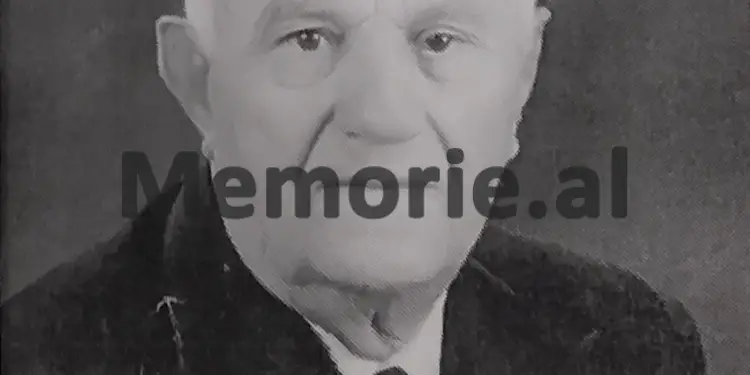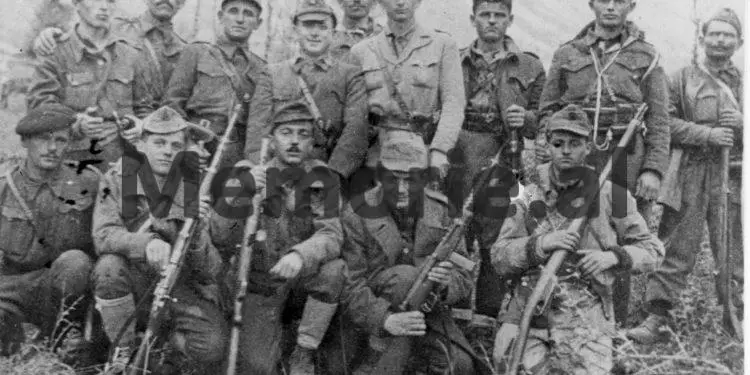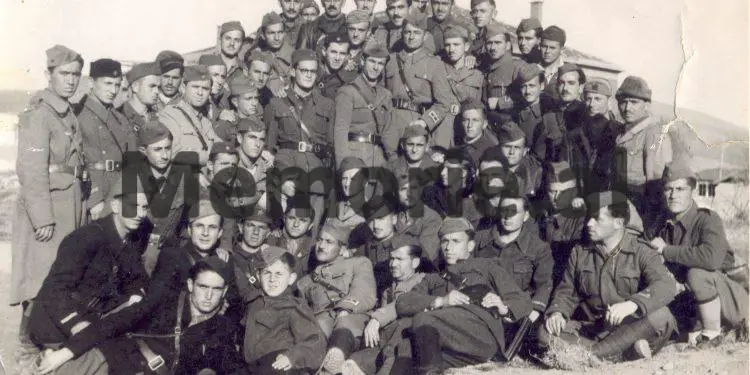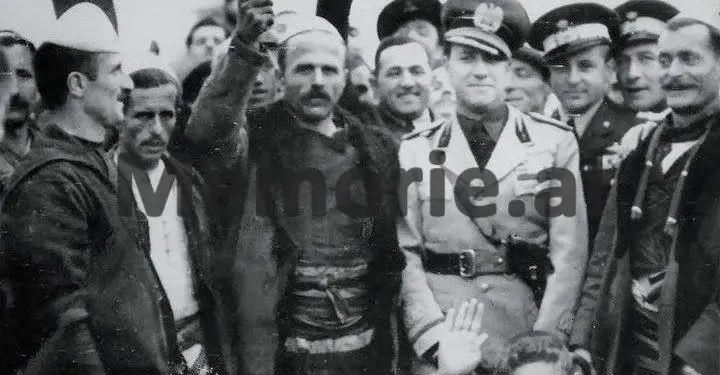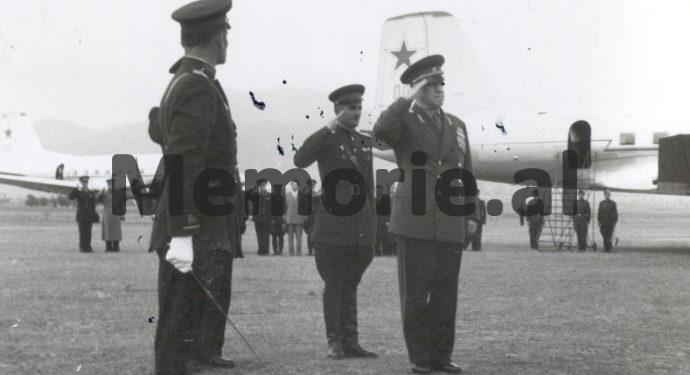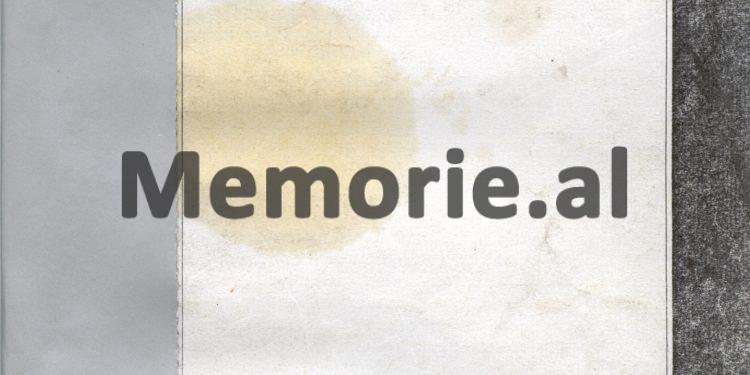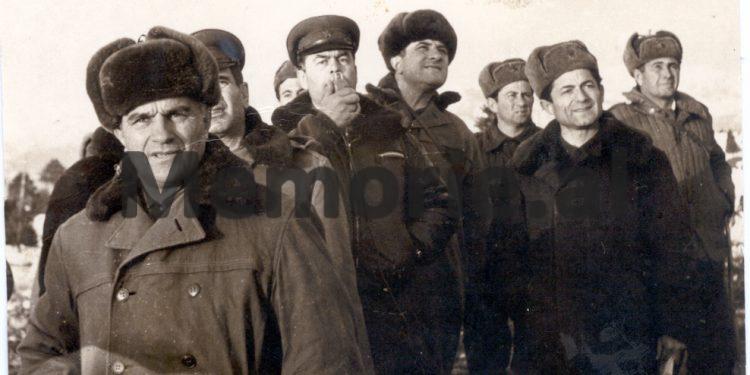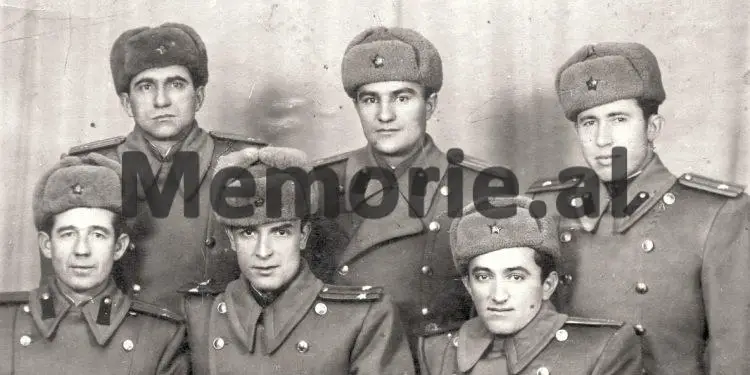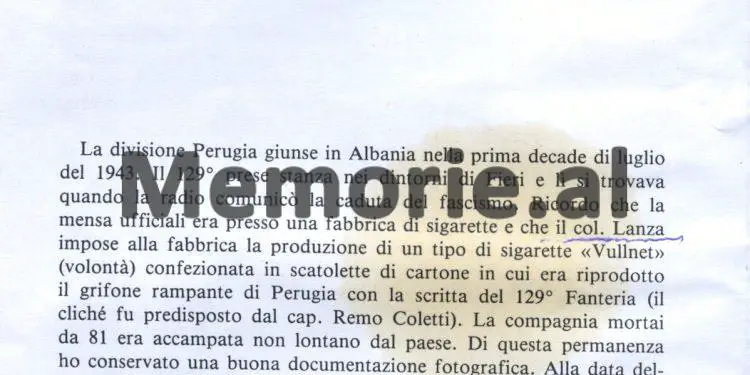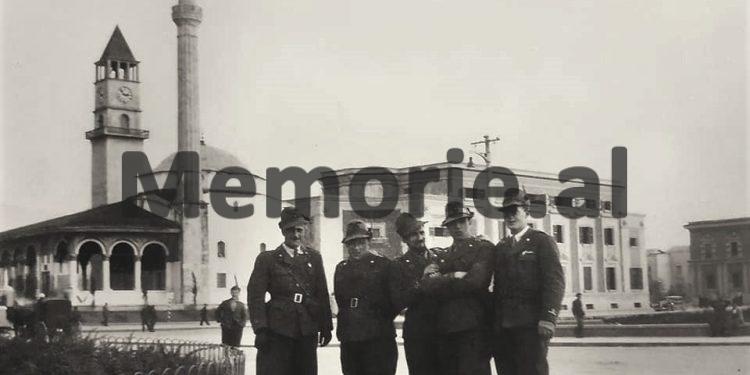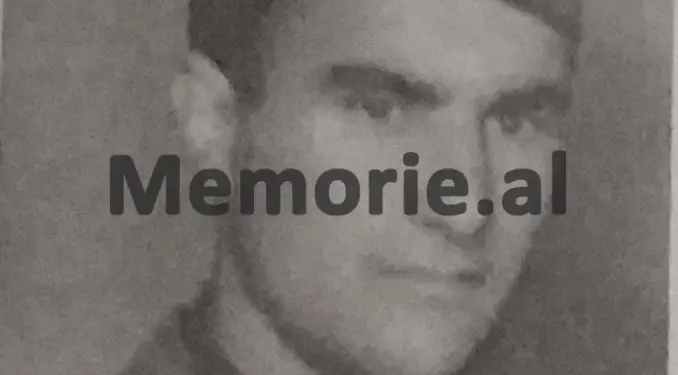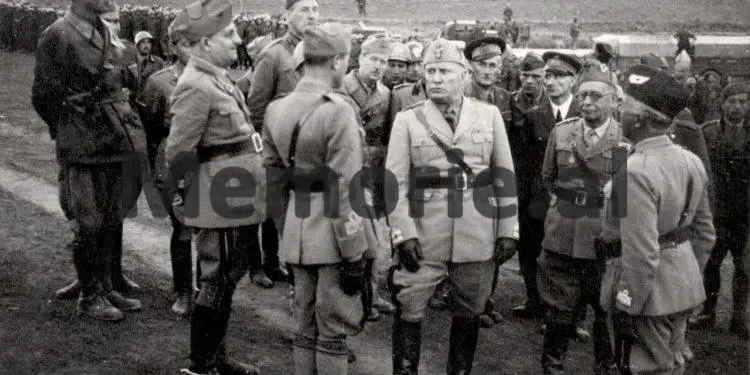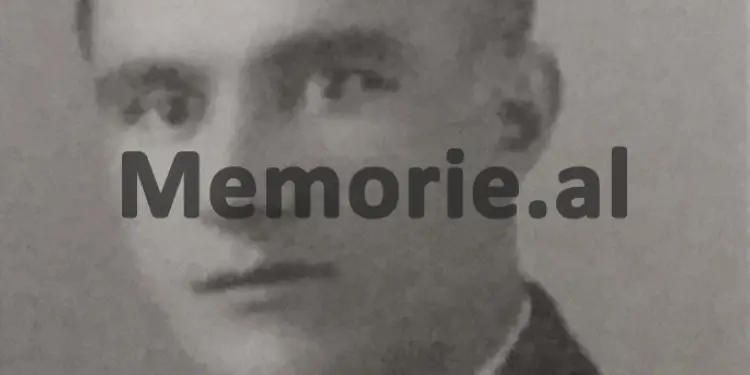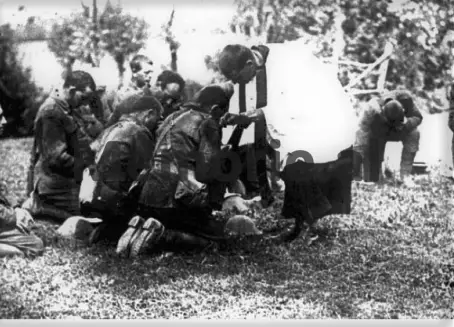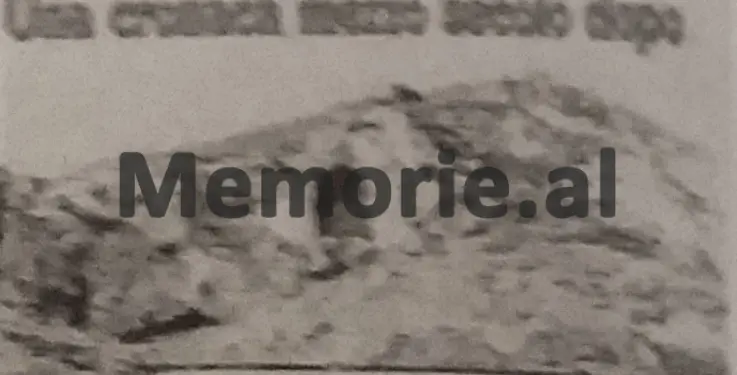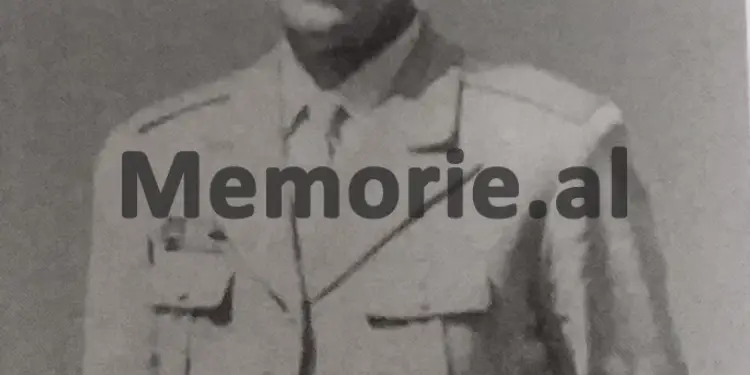Dashnor Kaloçi
The first part
Memorie.al publishes the memoirs of the former senior military, Major General Bako Dervishaj, former senior cadre in the partisan brigades during the Anti-Fascist War, regarding the events of September-October 1943, when after the capitulation of fascist Italy, several thousand troops armed by its soldiers and officers, they joined the Albanian partisans of the National Liberation Army led by Spiro Moisiu and Enver Hoxha. The Unknown Memoirs of Major-General Dervishaj, author of several books of study on the period of the Anti-Fascist War, who in his latest book, entitled “With the Italians”, wrote among other things: “According to the terms of the capitulation, the Army The Italian IX was obliged to end military operations and hand over weapons to the Albanian Resistance forces. But Italian commander-in-chief Renzo Dalmaco refused. He ordered the military units to surrender to the Germans. Only 15,000 soldiers and officers of the “Florence” Division refuse to fall into the hands of the Nazis. Of these, 15,000 enlisted in the ranks of the Albanian Army, forming the “Antonio Gramshi” Battalion.
“On September 8, 1943, Benito Mussolini’s fascist Italy unconditionally signed the capitulation and abandoned its ally, Adolf Hitler’s Nazi Germany. It was at this point that the long-running odyssey of survival began, of those thousands upon thousands of Italian soldiers and officers who once formed what was called “Mussolini’s legendary 8 million bayonet army.” Under the terms of the capitulation, the Italian Army IX was obliged to end its military operations and hand over its weapons to the Albanian Resistance forces. But Italian commander-in-chief Renzo Dalmaco refused. He ordered the military units to surrender to the Germans. Only 15,000 soldiers and officers of the “Florence” Division refuse to fall into the hands of the Nazis. Of these, 15,000 enlisted in the ranks of the Albanian Army, forming the “Antonio Gramshi” Battalion. This is what Major-General Bako Dervishaj, a former commander in some of the partisan units during the Anti-Fascist War, writes in his memoirs, which stops at a long time, describing the unknown history of Italian soldiers who came as invaders and triumphants. in Albania, and then left defeated. One of the most interesting events he witnesses in his memoirs are those after the capitulation of the Italian army, where hundreds of Italian soldiers joined the Albanian partisans and fought in their ranks until the end of the War in November 1944.
The capitulation of Italy in September 1943
Regarding the events of the capitulation period of fascist Italy, during the months of September-October 1943, the former senior military, Major General Bako Dervishaj, writes, among other things: of the German army coming from the Greek territory, hurried to take the cities and ports of Albania. At the same time, Italian forces gathered in garrisons without any final objective, or, more precisely, were in a dilemma: to join the Germans or to become allies with the forces of the Albanian Resistance, or any other Albanian political organization. The efforts were different. Since the “Perugia” Division did not accept the conditions arising from the capitulation to hand over the weapons, the nationalists of the organization “Balli Kombëtar” commanded by Hysni Lepenica, put pressure on this division with weapons. Their attempt to disarm the division (as I said above) failed tragically.
The Italian command decided to defend itself and gave the order “fire”. At the entrance of the garrison were left killed within minutes 33 ballistas, who tried to attack, along with their leader. In this situation, the Italian command decided to enter into negotiations with the partisan command, the latter represented by a group led by the chairman of the Communist Party for Gjirokastra, Bedri Spahiu. From this agreement was reached this compromise: The Italian Army would not be disarmed immediately, but at the moment of its embarkation for Italy. Before leaving the Albanian territory, the Italian army would hand over all the weapons and ammunition and board the allied ships that would depart from Saranda in the direction of Italy. The partisan forces would guarantee the free and unimpeded movement of the Italian column to the gate of Saranda.
Partisan forces took over the escort in the arms and front of the Italian army, in order to protect the latter from any possible attack by Germans or Albanian nationalists, who could seek revenge for those 33 killed in an attempt to take the garrison. Italian of Grehoh (Gjirokastra), part of the division “Perugia”. As it happened afterwards, the deed-agreement was respected until the last moment. The “Perugia” division arrived in Saranda, handed over all the weapons and while preparing to board, he was found under the surprise fire of the German army, stationed on the island of Corfu. German forces destroyed and sank the incoming ship to pick up Italian soldiers, so the Italians’ attempt to board failed fatally. Faced with this hopeless situation, hungry and above all demoralized, the Italians quickly withdrew to the interior of the Albanian territory heading for Vlora, in order to settle as best they could in the province.
Always accompanied and protected by the wings and partisans of the area, they took the direction of Kuç-Lumi Shushicë in the province of Mesaplik, and settled along the river Smokthina (Ramicë) in a wide field, covered with trees and with enough water for their needs. During their return, at the same time, in the area of Mesaplik, in parallel, another military action was undertaken called “War of Drasovica”, recalled General Dervishaj, regarding the period of capitulation of fascist Italy, where German forces did not allow the departure of the Italian army from Albania, bombing and drowning the steamer that came to take them to Saranda.
The Italians in the Drashovica war
But how did the events with the Italian soldiers that remained in Albania follow? In this regard, in his memoirs, General Dervishaj writes: “German forces coming from Greece, quickly entered Albania towards its South. With a part of the forces they intervened and immediately blocked the Italian military garrison in the area of Drashovica. In this garrison was a strong military material base: clothing depot, a military hospital, together with a pharmacy, about 1200 artillery shells and a large amount of ammunition depots of the Italian army, located in the fields Drashovica-Mavrovo. On September 14, 1943, another German convoy arrived in this garrison, coming from the South of Albania, which brought with it 6000 Italian prisoners (of the “Perugia” Division), collected from Përmet and Tepelena, as well as 100 Yugoslav prisoners.
The partisan command, after analyzing the situation, prepared an operational plan, where the aim was to break the myth of the German army, which until then had not found any serious resistance in Albania, as well as to release the Italian captives, who should never turned into an active contingent for the German army. The Germans were well armed, but on a completely unknown ground and unprepared for a surprise attack. On September 14, partisan forces and volunteer territorial forces, with eight mixed battalions and a 75/13 battery, led by Italian officers in cooperation with Albanian specialists and under the command of the partisan artillery commander, Ferid Hados, were put on alert. the valley where German forces were deployed. At 02.00 on the night of 15 September, the surprise attack began. The artillery shelling of the ammunition depots, which exploded one after the other, as well as the attack from both sides, created a perversion and panic within the German army, which could not be organized.
Within 4-5 hours the partisan forces completely exploded the German defense and both sides came out to the meeting line by the river, separating on one side the Italian captives and on the other hand freeing the German forces trying to escape from the fire. Fighting to pursue the Germans, without letting them reorganize, lasted 22 days. They were pushed to the outskirts of Vlora, where they organized new defensive positions, however, September 15, 1943 marked the annihilation of the German division in the war of Drashovica, a war where for the first time, alongside the partisans, Italian artillerymen took part, the first to join the Antifascist National Liberation Front. After the destruction of the German garrison in Drashovica, the military hospital and the pharmacy were taken, all untouched.
The 1200 artillery shells were also taken, which, not being able to be held by the Albanian armed forces, were left free to be taken by anyone who would need them. The Italians liberated from the German camp took the road in the direction of Mesaplik, to reach the Smokthina River, where they would join the other forces returning from Saranda after the failed attempt to flee to Italy. During the Drashovica war, 13 Italian doctors were released, among others. During the armed confrontation, 11 partisans were killed and 40 others were seriously wounded in this war, including the leader of the operation in the Drashovica war, Comrade Hysni Kapo, as well as my uncle, Mevlan Dervishaj, commander of a mixed battalion partisan. Both received very serious injuries.
My uncle was seriously injured in the lungs but nevertheless escaped and dedicates his life to those 13 doctors who stayed on his head for days and nights until he recovered completely. These Italian doctors then served in partisan field hospitals and remained there until the end of the war. I remember once an Italian doctor, after being given a cassette with surgical instruments, asked me if it would be possible for him to make this cassette his own after the war was over. I was very impressed by this request and from my side I assured him that his wish would be realized but first I wished him to come out of the war safe and sound and take care of himself “, recalled General Bako Dervishaj, regarding the handover of Italian soldiers to Albanian partisan formations and the joint struggle against the German forces that came to Albania at that time from Greek territory.
Involvement of Italians in the War alongside partisan forces
Regarding the involvement of the Italian army in the war alongside the Albanian partisans, among others, General Dervishaj writes: “In early October 1943, as every day, Celestino came to my house and informed me that all the Italians were already settled and in the meantime sought to join the Albanian army. I felt very happy, thinking that my modest help had helped to raise their morale a little. As my sister Rakibeja was brought something to eat (Rakibeja was later killed by the Germans at the age of 17), I prepared an open passage permit, so that they would not encounter obstacles until they met the first partisan unit. When he greeted me, Celestino gave me a pair of binoculars, which I kept until the end of the war.
In those moments I did something I had rarely done before in my life: I prayed to God for their salvation… It was the winter of 1943-1944. Along with the winter, the war between the Albanian resistance forces and the Nazi occupiers intensified. But while the Germans were armed to the teeth, dressed and barefoot, the partisans struggled to withstand the great cold hungry, racked and barefoot. And it was in the cold days of March 1944 that the Allies found a way to help us with weapons and clothing. At that time I had just been appointed commander of the III battalion of the V attack brigade. I found the battalion near the village of Sevaster. I ordered my friends to distribute the aid. The distribution would be organized according to the needs of each, i.e. someone would get a pair of pants, someone else a jacket and someone else a pair of shoes and so on.
When I found out about Celestino and his friend that I had lost all contact with for 6 months, I ordered my partisan comrades to give them a full uniform starting from the bag to the shoes. The idea that they faced the harsh winter alongside the Albanian partisans and with a very “career” rich in anti-Nazi operations, impressed me. My order impressed my friends (since then I started to consider them as such). Shortly afterwards the two came and introduced themselves and asked me if perhaps any mistake had been made in the preferential distribution of the garments and if I was aware. After assuring them that there was no misunderstanding and that the partisan comrades had no objection, I saw how happy they were.
And it was an almost childish happiness that I could not and will not forget. I realized they felt good between us. I remember the Macukulli war from July 9-25, 1944. It was a difficult war. There we were killed by two partisans (one of whom was Sesto Tatare from Farli) and 7 partisans were seriously wounded (among whom Acorso Pietro from Arezzo). The whole battalion gathered at the funeral of the two killed. It was not talked about for long, but the pain of all the friends was great. No Italian had been killed in our battalion until then. We were very sorry that an Italian was killed in foreign lands. We then rushed to move the injured. We changed the direction of the movement to the village of Lis to take them to the partisan hospital. The wounded Acorso was held in a vig and the companions moving it took turns one after the other.
As far as I remember, he was wounded in the chest. When he opened his eyes he looked at us as if asking for something. I tried to keep it with courage, but also to speed up the movement. Friends stood by and cared for him and the other wounded. The solidarity and sacrifices of the partisans in difficult moments were extraordinary and indescribable. The slogan “One for all and all for one”, was more than a human norm, more than a social and fraternal norm, it was an absolute law of existence, which can be understood only by those who have experienced partisan warfare. The Italian partisans became part of this solidarity. On August 23, 1944, we were in Peshkopi, Dibra district, on Korab mountain and exactly on one of its peaks, Inoske, at an altitude of 2165 m… Opposite us were the German forces, which had two days in defense. As it turned out, both sides had planned the attack against each other.
The next night, around 21.00, with three battalions of the 5th Brigade we launched an attack and exploded the German defense. They could not organize themselves in combat and immediately began withdrawing. After this defeat, the Germans accelerated their withdrawal and this garrison was the first to withdraw from the Balkans. As I watched the fighting from a checkpoint with Commissar Reiz Malile, I noticed that nearby, not far from the mortar position, was Celestono. I approached him and gave him binoculars (which had once been his) for him to look at as well. When it was over I asked him how he looked with them. He replied that the binoculars had already found the owner and then added with a laugh: “The gift has served the anti-fascist alliance.” Meanwhile, Commissar Malile, who was accompanying me, asked “Are you a member of this alliance?” Celestino immediately replied: “Of course”, then added: “I am sorry that Italy is waiting for the rescue from the Anglo-American alliance, while Albania, small, is taking care of its own destiny”!
In mid-September, I was ordered to leave the 3rd Battalion in Kukës and return to the village of Shkalë in Tirana. The 1st Corps had already been formed, and I was appointed Chief of Information Corps I. I parted ways with my battalion comrades and the Italian partisans, whom I would not see again from that day on. I handed over the battalion to Hysen Çinos. Along with my will were messages for Celestino and other Italian partisans. When I arrived at the corps headquarters I learned with great sadness that the battalion commander Hysen Çino (today “People’s Hero”) had been killed just two days after I left. When I came to Tirana, although on a different assignment, I tried to get information about my battalion in general and the Italian partisans in particular. The war was coming to an end and meanwhile the involvement of the Italians in the National Liberation War was becoming more and more organized.
After the liberation of Tirana, I was very happy when I received information about the creation of the VI Battalion. “On November 24, 1944 in Fushë-Kosovë (Lipian) the V attack brigade gathered and with all the Italian partisans of this brigade the VI battalion was formed, which consisted of three companies with about 180-200 partisans”, concludes his memoirs, former senior military Bako Dërvishaj, for Italian soldiers who during the years of the War 1943-’44, fought alongside Albanian partisans.
Antonio Gramshi Battalion Leadership
- Battalion Commander Captain Ernesto Celestino
- Commissar Battalion Captain Giorgio Ghia
- Z / Battalion Commander Captain Bruno Regno
- Deputy Political Commissar Lieutenant Izedin Bimo
The company of I
- Company Commander Lieutenant Franchini Fasco
- Company Commissar Lieutenant Agevati Xhino
- N / Company Commander N / Lieutenant Chinoti Natale
Company II
- Company Commander Lieutenant Gatto Renato
- Company Commissar Lieutenant Fuxheli Axhelino
- N / Company Commander N / Lieutenant Aversaj Sidoro
Bako Dervishaj, former bodyguard at the Palace of King Victor Emmanuel III in Italy, who became General Enver Hoxha
Bako Dervishaj was born on January 6, 1918 in the village of Ramicë in the district of Vlora, where his family comes from. His father, Hazbi Dervishaj, in the summer of 1920, together with some of the other men of that family, participated with weapons in hand in the Vlora War. After finishing primary school in his native village, Bako went to the city of Vlora, where for four years he attended studies at the Commercial School, which at that time was one of the most favorite for children of well-known families, not only of the province of Vlora. After graduating from that school, in 1937, Bako was called up for compulsory military service, where he was found on April 7, 1939. In September of that year, being an effective member of the “Lupo Di Toskana” regiment, he was transferred to Rome in the regiment “Granatiere di Sardegna”, with the battalion “GUARDIA REALE ALABANESE”, (Royal Albanian Guard), with the rank of non-commissioned officer (Caporale Maggiore) In that battalion that performed the guard service at the Palace of King Victor Emmanuel III , Bako served until 1942 and at that time he returned to Albania. From the first days he had just returned to his homeland, Bako joined the Anti-Fascist Movement and was appointed commander of the partisan forces of that province and political leader of the National Liberation Council. With the creation of the 5th Assault Brigade in the Vlora Region, he joined that partisan formation, where he was assigned the task of commander of the fifth and third battalion of that unit. The end of the war found Bako Dervishaj in the position of Chief of Information of the First Corps of the National Liberation Army commanded by Spiro Moisiu and Enver Hoxha. After the end of the war, he served as Chief of the People’s Defense Section in the districts of Tirana, Durres, Elbasan and Dibra. He was later appointed Commander of the 15th Saranda Assault Brigade, and during the break-up period with Yugoslavia, he was appointed Commander of the Border Regiment, for the protection of the northern borders, which included the area from Lake Prespa to on the Buna River. In 1949, he was sent to study in the Soviet Union, and in 1952 he graduated with honors from the Frunze Military Academy. After graduating from that academy, he returned to Albania and was appointed Chief of Staff of the Korça Division and Commander of the Third Corps. He later served as commander of the XVI Brigade in Elbasan, the First Brigade in Tirana and the Infantry Brigade in Shkodra. In 1963, Bako Dervishaj was promoted to the rank of Major General and in 1972 he was transferred from Korça to Tirana, where he was appointed Inspector General of the Army at the Ministry of National Defense. He remained in that position for only four years, after in 1975, when the so-called ‘senior military caste’, led by Beqir Balluku, was attacked, he was released. Since then, Bako has devoted himself to studies on the Anti-Fascist National Liberation War and has managed to publish seven voluminous books describing events of that period. Those books have aroused great interest abroad and he has received several letters from Italian scholars and ex-military who during the war years, were in Albania in the ranks of Mussolini’s Italian army. The latest book published by Bako Dervishaj is entitled “With the Italians” and there he described the war of Italian soldiers in the ranks of the Albanian National Liberation Army led by Spiro Moisiu and Enver Hoxha, part of which we are publishing in this article. /Memorie.al




